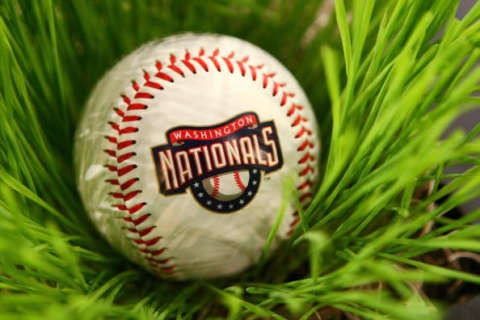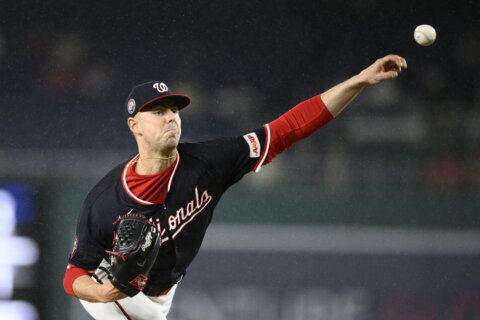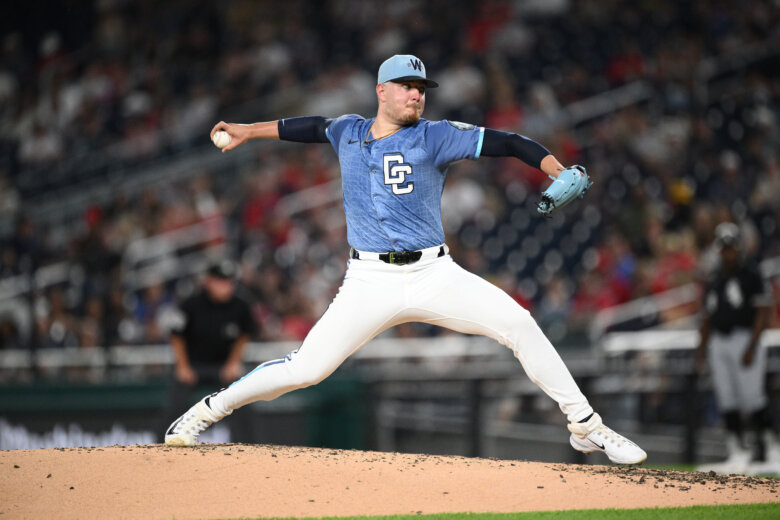“Anything that happens in baseball is never planned.”
Washington Nationals second baseman Brian Dozier is talking about the silly little things: the celebrations, the traditions, the routines that lift the mood and keep a six-month traveling party of highly-paid mercenaries sane as they try to compete for a championship.
It’s why the best of such trivialities come organically, even if they’re later co-opted: The crowd singing “Take On Me” in Mike Morse’s fourth at-bat and Kevin Frandsen’s “There is no wrong pipe.”
But no Nats team has had as many silly traditions as this one, from the gold and rose sunglasses, to “Baby Shark,” to awkward hugs and dugout dancing after home runs.
One more that may not be so trivial — the unofficial anthem that binds the clubhouse via Bud heavy-soaked videos of a twerking Dozier — Pedro Capó’s “Calma.”
Probably the best video I’ve ever take pic.twitter.com/TSyrgphebj
— Kelyn Soong (@KelynSoong) September 25, 2019
Baseball clubhouses at every professional level often struggle to connect the two main factions of players. White, American-born, largely English speakers usually comprise a majority, while Latin American-born Spanish speaking natives make up a secondary chunk.
By 2017, MLB was less than 7% African-American, but 27% Latin-born, and more than 60% white, American-born players. It is often incumbent upon Latin players to learn English to get by, something some teams are ahead of the curve on, notably the Houston Astros.
But Dozier, whose Fulton, Mississippi roots drip like molasses from his vowels, has long taken a proactive approach to bridge that gap ever since he broke into the big leagues with infielder Eduardo Escobar on the 2012 Minnesota Twins.
“I just took it upon myself a long time ago,” said Dozier. “He struggled with English early on when we started playing about 10 years ago together. I thought it was pretty important for me — he was one of my best friends, so why not learn some Spanish?”
It seems simple, but it’s not so commonplace. Dozier said other American-born Nationals can speak some Spanish, but few players in baseball embrace both the language and culture as openly as he does.
“Calma” is the conduit.
“I think every year, a way for me to learn more Spanish and to interact is through music,” Dozier said, explaining that Aníbal Sánchez first introduced the song to him on the team plane. “They let me know the No. 1 (singles) out and stuff, the best songs to dance to and listen to.”
From Parra’s “Baby Shark” silliness to the sunglasses, picked up from a promotional giveaway along with Sánchez and Fernando Rodney on a June road trip in Detroit, this year’s club seems to ride with the tide of whatever’s working.
“I think that’s the first time we danced in the clubhouse after a win,” said Sean Doolittle of the Detroit series, now defined by the free shades. “[The sunglasses] helped change the culture in this clubhouse. May was tough for us. They’ve helped us walk that fine line of staying loose, having fun.”
Past iterations of the Nats have taken on the personalities of their stars and elder statesmen, notably Jayson Werth in recent years. But even with strong personalities like Max Scherzer in the clubhouse, the 2019 Nats seem to be defined by the face that no one personality is dominating the room.
“Every year is different. Every clubhouse, every team,” said Ryan Zimmerman, who has witnessed every Nats clubhouse in team history. “You have certain guys that come and go, but each one kind of creates their own unique chemistry.”
That chemistry — the attitude of this freewheeling group dancing, two wins from a championship, while the Astros melt down under the pressures of their own mistakes and expectations — might best be expressed by their anthem’s breakdown.
Lento y contento, cara al viento
Slow and happy, facing the wind
Dozier was signed to a one-year, $9 million deal this offseason, has just six at-bats this postseason, and has yet to see the field so far this World Series. Parra was waived by the hapless San Francisco Giants in May before signing in Washington.
They may seem like unlikely clubhouse leaders embodying the “Calma” spirit, but that’s the fun part about baseball — anything that happens is never planned.
- Strasburg stars as Nats rout Astros 12-3 for 2-0 Series lead
- Will ‘Baby Shark, doo doo doo doo doo doo’ do Series debut?
- Ailing Suzuki delivers big swing as Nats near title
- World Series first at-Bat homers
- Washington ‘Nationals’ Cathedral? How the church goes ‘all in’ to support the Nats at World Series
WTOP’s Dave Preston contributed to this report.







